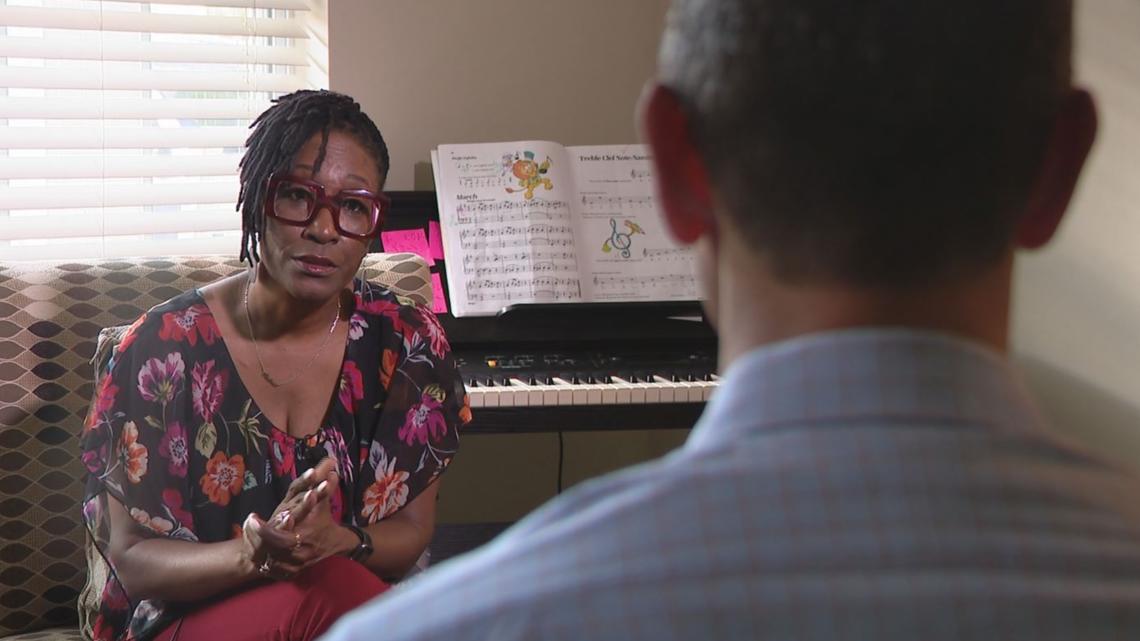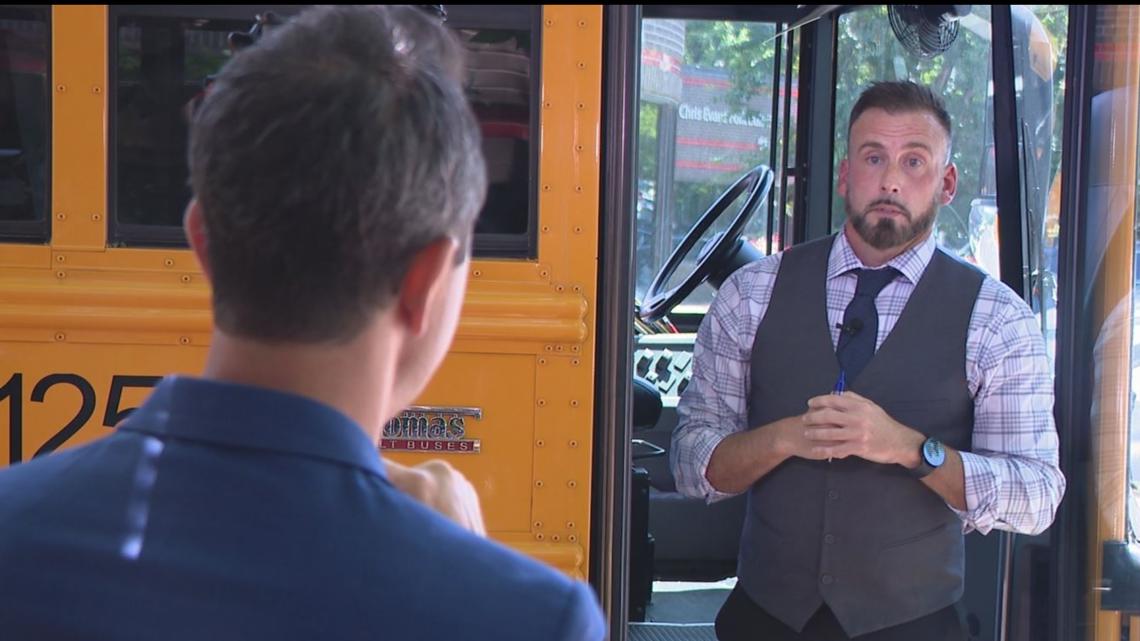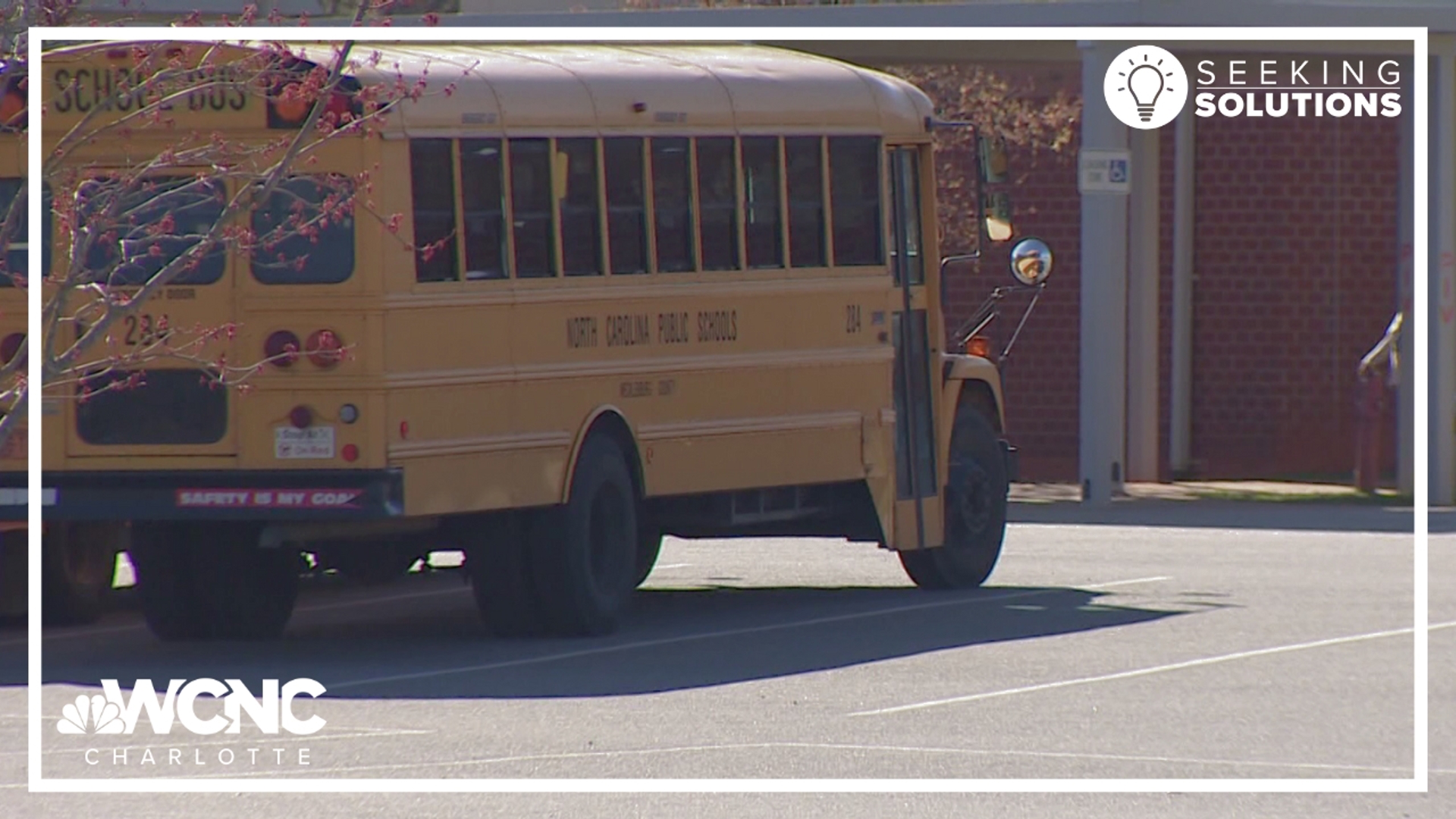CMS bus drivers fired for cocaine, falling asleep at the wheel, district data reveals
Data analyzed by WCNC Charlotte shows school buses in the Carolinas crash, on average, eight times every school day. No district has more crashes than CMS.

School buses are widely considered one of the safest forms of transportation, but a WCNC Charlotte investigation found the carriers of our kids are involved in crashes eight times every school day, on average, in the Carolinas.
No district in those two states has more crashes than Charlotte-Mecklenburg Schools. In fact, crash records show it's not even close.
While district data shows many of the crashes are not bus drivers' fault, personnel records show CMS fired a handful of school bus drivers last year alone for everything from falling asleep at the wheel while driving students to testing positive for cocaine.
State records show the number of bus crashes across the Carolinas in recent years has only minimally decreased. Crash data reported by school districts to their states and analyzed by WCNC Charlotte reveals some crashes continue to send kids to the hospital and in rare cases, leave other people dead. Those are just the ones we know about.
'We were livid' One parent said she didn't know about her child's bus being in a crash until they found glass in their hair.
Andrea Higgins says she only learned her kids' bus driver struck a tree branch and shattered a window when her 8-year-old daughter came home late in February with broken glass in her hair.
"They failed to notify us," Higgins said. "We were livid."
Higgins said her 7-year-old was also on the bus when it happened and told her the bus tried to avoid hitting a car and ran off the road.


"It was very scary," Higgins told WCNC Charlotte. "She didn't want to ride the bus. Neither of them did. They didn't want to get in an accident."
According to CMS, the Irwin Academic Center school bus hit a tree as the driver made a turn, breaking a window but resulting in no injuries "to any of the four students on the bus or the driver." CMS Media Relations and Crisis Communications Executive Director Susan Vernon-Devlin said the district's transportation department alerted the school of the incident "after school hours at approximately 6:15 p.m." and the principal reached out to the families impacted the following day. Records show the district did not discipline the bus driver as a result.
"You have to protect (our kids)," Higgins said. "You have to keep them safe. That's the expectation."
Taking steps to better protect kids Nearly half of bus crashes last year were preventable. CMS is taking steps to prepare its drivers better.
District records show almost half of CMS bus crashes last school year were labeled non-preventable, which was an increase from prior years. Transportation Executive Director Adam Johnson said other drivers are part of the problem.
"Patience is so thin. Think about that person that cut you off in traffic or that person that wouldn't let you merge into traffic," Johnson said. "Now, imagine also now you're driving a 40-foot vehicle with 30, 40, 50, 60-plus students on board. It's really important that they kind of see that from the lens of the bus driver and that stress that it puts on them."
Johnson said the other half of crashes during the 2023-2024 school year, labeled preventable, were generally the result of traffic and newer bus drivers. CMS is dedicating more resources over the summer to better train, retrain and retain its newest drivers.
"Most of them come to us with little to no experience," Johnson said. "They're new to driving a school bus. We're trying to bring people in, educate them on the process and give them all the support that they need to be successful."
Johnson said it takes 52 days after a driver submits an application until they can start driving students. That period includes four days of classroom training, four days of driving with the Department of Motor Vehicles and a two-week training period with CMS Transportation. While his drivers do their part, Johnson hopes the public will help keep the roads safe.
"While there's certainly things we can do better and we will continue to make those improvements, it's always a great idea if the public at large can work with us and give us a little space around our buses," he said. "That kind of partnership would certainly help, I think, reduce some of those accidents."
Personnel problems District records show CMS fired drivers for various offenses, from falling asleep at the wheel to testing positive for cocaine.
Johnson added the district tests drivers for drugs before hiring them and then randomly throughout their employment. In addition, he said CMS regularly checks drivers' licenses for speeding tickets and other crimes after an initial license check.
District records show CMS fired several drivers last school year, one directly tied to a crash, another for falling asleep at the wheel while driving students and a few for failing drug tests, including one for cocaine. The district began randomly drug testing drivers after a school bus crash in 1991 killed three students.
"How concerned should we be as parents?" WCNC Charlotte asked about the frequency of bus crashes.


"I wouldn't want parents to not be concerned," Johnson responded. "I think you should be concerned with your kids' safety, because that's important to us … but we do want the parents to feel assured that we do our best to make sure that the drivers are doing what they're supposed to do and if we do see things that the drivers are not doing correctly, we get those things corrected."
While responsible for more frequent crashes, CMS is not the only district facing concerns.
Personnel records show Catawba County Schools fired one of its drivers last school year after troopers charged him with DWI. The North Carolina State Highway Patrol accused him of being nearly three times over the legal blood alcohol limit while driving a school bus, just minutes after he dropped off the last student.
Meanwhile, court records show the Burke County Public Schools bus driver who troopers said ran off the road and flipped her bus, injuring several students back in April, had a history of speeding in her off time. The citations, however, were spread out enough, per state law, to not impact her driver certification. Her personnel file shows the district took the keys away from her just days after the crash and "demoted" her to a substitute bus monitor. However, she "was not needed during the remainder of the school year," but remains on the payroll "if needed as a sub bus monitor this upcoming year."
Bus safety stats Federal data shows school buses are 70 times safer for students than cars.
State records identify roughly 1,500 crashes every year, on average, in North Carolina and South Carolina. That said, the National Highway Traffic Safety Administration, has been cited as reporting school buses themselves, even without seat belts, are roughly 70 times safer for students than a car. Even though we regularly hear about crashes, kids rarely die as a result.
According to CMS, seven crashes led to students being taken to the hospital last school year. Two of those were preventable.
Contact Nate Morabito at nmorabito@wcnc.com and follow him on Facebook, X and Instagram.


